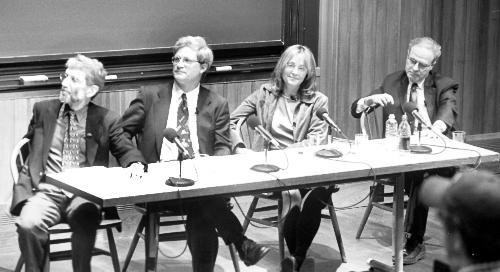
News
Progressive Labor Party Organizes Solidarity March With Harvard Yard Encampment

News
Encampment Protesters Briefly Raise 3 Palestinian Flags Over Harvard Yard

News
Mayor Wu Cancels Harvard Event After Affinity Groups Withdraw Over Emerson Encampment Police Response

News
Harvard Yard To Remain Indefinitely Closed Amid Encampment

News
HUPD Chief Says Harvard Yard Encampment is Peaceful, Defends Students’ Right to Protest
Professors Reconsider Core System

Just over 50 faculty, administrators, and students attended last night’s symposium on the Core to hear four senior Harvard professors weigh in on its future. In the first public discussion about the recently begun curricular review, Harvard College Professor Jorge I. Dominguez, Gurney Professor of English Literature James Engell, Ford Professor of Social Sciences David Pilbeam and Harvard College Professor Maria M. Tatar were featured speakers.
The panel was presided over by Dean of Undergraduate Education Benedict H. Gross ’71 and was attended by Dean of Faculty William C. Kirby.
In their speeches, the featured professors repeatedly said they expected students to play a critical role in this curricular review.
Two professors independently praised a 1997 critique of the Core written by James T. L. Grimmelmann ’99, Sarah K. Hurwitz ’99 and Benjamin A. Rahn ’99—three students that served on the Student Affairs Committee of the Undergraduate Council. Engell said that he hopes students feel motivated to produce such a report again.
“It is one of the most astute and penetrating reports ever produced,” he said.
But students’ attendance was lower than expected last night.
Even though the Office of Undergraduate Education had predicted an attendance of over a hundred, Gross said he was happy with the turnout.
“I was pleased to see that there were a lot of informed and interested students here,” he said.
And students expressed an equal amount of respect for the opinions of the Faculty.
“I was very impressed with all the work that went into these talks tonight, and I am confident that students and faculty can come together for a thoughtful review,” said Alexander B. Patterson ’03, a student member of the Committee on Undergraduate Education .
Yet despite citing the important role students will play thought the review process the professors were also quick to point out differences between student and faculty prerogative—making it clear which would ultimately prevail.
In response to a question posed by David M. Darst ’05 on whether or not students might ultimately be able to vote on a general education program to replace the Core, faculty dismissed the idea.
“This is not a democracy. While it is important to have a good understanding of student opinion, the decision will ultimately be made by us,” Pilbeam said.
Pilbeam, who said that he recently met with a group of 12 first-years to discuss the Core, spoke about how decreased student attendance and interest in the Core has made his experience teaching in it much less enjoyable.
“I feel like I am part of an experiment in distance learning,” he said. “And it is frustrating when you put your soul out there every time.”
But the majority of last night’s debate did not take place between students and faculty—instead, it was the professors who most often disagreed with each other.
While Dominquez said that the time has come to revisit the fundamental questions justifying Harvard’s curricular program, he said he does not think the Core should be completely dismantled.
“This design is better than the alternatives of which I am well aware,” he said.
Others were more critical, questioning the whole rationale behind the Core.
“I believe the modes of thought philosophy behind the Core is fundamentally flawed,” Engell said.
He said that the content of a particular Core class inevitably determines how the class should be taught—more so than the general “approaches to knowledge” represented by the different areas of the Core.
Engell also complained that the differences between current subsections has become increasingly blurred.
“I plead guilty to not being able to tell the difference between Historical Studies A and B,” he said.
And Tatar who had originally said that the idea of “abolishing” the Core made her anxious, said that as the evening progressed the number of arguments raised against the Core led her to question whether it could be saved.
“I wonder whether it could be tweaked or whether it should be overhauled,” she said.
But the majority present, including Gross, did not agree.
“I am not talking about abolishing the Core and I don’t think Dean [of Faculty William C.] Kirby is either,” he said.
And while this panel—the first in an ongoing series of curricular review—focused solely on the Core, Gross reminded the audience that there are other aspects of the curriculum deserve as much scrutiny.
“I personally think concentration requirements are more restrictive than those of the Core,” he said.
Broader concerns about Harvard’s current curriculum, in addition to ongoing questions about the vitality of the Core, will be addressed in a second symposium next Thursday.
At this time, Dean of Yale College Richard Brodhead, Dean of the College at Brown University Paul Armstrong and Miller Professor of Jewish History at Columbia Michael Stanislawski ’73 will speak about curricular models at their institutions.
—Staff writer Jessica E. Vascellaro can be reached at vascell@fas.harvard.edu
Want to keep up with breaking news? Subscribe to our email newsletter.
